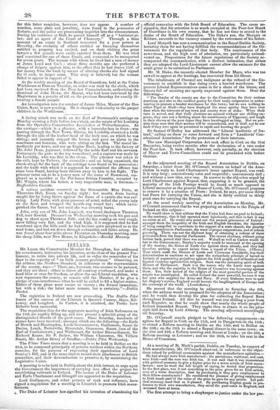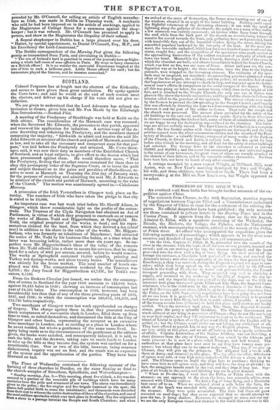IRELAND.
Mr. Lucas, the Conservative Member for Monaghan, has addressed Ins constituents, intimating his intention, at the close of the present Par- liament, to retire into private life, and to enjoy the remainder of his days in the capacity of "an Irish country gentleman." Observing on
- the address, the Northern Standard, in reference to the representation of the county, says—" There are, however, two courses to be pursued, and they are these : either to throw all courtesy overboard, and make a bard blow at once for freedom, or allow the one Liberal candidate, who now represents the county, to remain still the Member' if he give a pledge of non-interference when he will be called to fill ahigher station. Either of these plans must secure us victory ; the former immediate, but with a risk ; the latter more remote, but a certainty."—Dublin Packet.
The registries in Ireland are now proceeding. The Dublin Pilot boasts of the success of the Liberals in Queen's County, Mayo, Kil- kenny, and Longford. In Carlow, it is admitted, the Tories have hitherto been successful.
The requisition-lists for the aggregate meeting of Irish Reformers on the 15th are rapidly filling up, and now present a splendid array of the distinguished friends of the good cause. Since Saturday, hundreds of names have been received ; amongst which are the following—the Earls of Howth and Huntingdon, Lords Gormanstown, Guillamore, Stuart de Decies, Louth, Netterville, Riversdale, Oranmore, Stuart, (son of the Earl of Castlestewart,) and Wallseourt, Sir Arthur Blennerhassett, Sir Richard Keane, Sir P. Bellew, Sir William Chatterton, Mr. Villiers Stuart, Mr. Arthur Henry of Straffan.—Dublin Pilot, Wednesday.
The Ulster Times states that a meeting is to be held in Belfast on the 21st, to be composed principally of persons resident within the Northern counties, for the purpose of expressing their approbation of Lord Stanley's Bill, and at the same time to record their attachment to British connexion, and their determination to preserve it, by maintaining the Legislative Union.
A meeting is to be held in Dublin about the 20th instant, to urge upon the Government the importance of carrying into effect the project for establishing railroads in Ireland. The names of the Duke of Leinster and Earls Charlemont and Glengall are appended to the requisition.
Lord Guillamore, and other persons of rank and influence, have signed a requisition for a meeting in Limerick to promote Irish manu- factures.
I. The Duke of Leinster has signified his intention of abandoning his
official connexion with the Irish Board of Education. The cause as- signed is, that his attention is so much occupied at the Poor-law Board of Guardians in his own county, that he has not time to attend to the duties of the Board of Education. The Duke's son, the Marquis ox Kildare, succeeds to the vacancy caused by the retirement of his father.
Lord Morpeth has sent a communication to the Royal Dublin Society, lecturing them for not having fulfilled the recommendations of the Go- vernment for the regulation of that body. The continuance of the news-room, and the high cost of admission, are particularly animad- verted on. Propositions for the future regulations of the Society ac- companied the communication, with a distinct intimation, that unless they are adopted the Lord-Lieutenant cannot allow the estimate for the usual grant to be submitted to Parliament.
Mr. M. Blake, the recently-elected Member for Mayo, who was too unwell to appear at the hustings, has recovered from his illness.
The inhabitants of Clonmel are indignant at the refusal of the Go- vernment to establish in that rising town a bonded warehouse. The present Liberal Representatives come in for a share of the blame, and threats full of meaning are openly expressed against them. Hear the following- " The thanks of the county are due to the Committee for their zealous exertions, and also to the resident gentry for their ready cooperation in endea- vouring to procure a bonded warehouse for this town ; but we owe nothing to either Pigot or Shell—they have displayed the same apathy they have ever done when the interests of our town and county were at stake. When their tarn is served, and that their elections are secured without one shilling ex- pense, they care not a farthing about the constituency of Tipperary, and laugh in their sleeves at the poor dupes they have humbugged so long. But we pro- mise these men that their actions will be remembered, and it shall not be our fault if they ever again be permitted to cajole and humbug the people."
Sir Samuel O'Malley has addressed the " Liberal landlords of Ire- land," callinc, on them to come forward and form a " Landlords' Con- stitutional Association," for the protection of their interests.
The new Municipal Corporation Act took effect in Cork on the 31st December' being twelve months after the declaration of a rate under the Poor-law. It took effect, however, only partially, as the election of Mayor and Town-Councillors could not be proceeded with before October.
At the adjourned meeting of the Repeal Association in Dublin, on Saturday, a letter from Mr. O'Connell, written on behalf of the Asso- ciation in reply to Lord Charlemont's letter against Repeal, was read. It is very long ; ostentatiously calm and respectful ; uncommonly dull ; and without a new idea, save one. In answer to the objection urged by Lord Charlemont against Repeal, that, supposing it to be granted, the majority of the Irish Peerage would be found as much opposed to Liberal measures as the present House of Lords, Mr. O'Connell proposes to remove it by a creation of Peers : Ireland, he says, got some thirty bad Peers for carrying the Union, and she is fairly entitled to thirty good ones for carrying the Repeal.
At the usual weekly meeting of the Association on Monday, Mr. O'Connell announced that he was preparing an address to the People of Ireland on this subject— He would show in that address that the Union had done no good to Ireland; on the contrary, that it had operated most injuriously, and that in fact it was no union at all. He would also point out the present grievances of Ireland : amongst them the inequality of the Irish and English franchise, the injustice of being compelled to contribute to the support of a state church, the paucity of representatives in Parliament, the want of proper corporations, and of reform generally, There was not the slightest hope of obtaining a redress of these grievances from the Imperial Parliament. The recent elections, without going further back, proved that there was not. Walsall as well as Carlow would be lost to the Government ; Stanley's majority would be increased at the opening of the session ; the House of Lords was against them already, and they had therefore nothing to expect unless from a repeal of the Union. (Cheers.) That which made the Houses of Lords and Commons formidable, was their determination to continue to act upon the melancholy principle of hatred to Ireland, of augmenting prejudices against the Irish people, and of fanatical and bigoted virulence against their religion. Such was the animating spirit of both Houses of Parliament. Such was the reason why the Lords were against them, and why the majority in the House of Commons was increasing against them. Yes, their hatred of the religion of the most powerful portion of the empire was unmitigated. He called Ireland the most powerful, because it was her sons who supplied the Army and Navy. If every Irishman were to quit her Majesty's service, England would become the laughingstock of Europe and the contempt of the world. (Loud cheers.)
He moved that the meeting be adjourned to Saturday the 9th, when the address would be proposed for the adoption of the Association; and he would then develop his plan for collecting the Repeal Rent throughout Ireland. All that he wanted was one shilling a year front each Repealer, so that he could show that nearly the whole people of Ireland demanded Repeal. They ought then to obtain it on the prin- ciple laid down by Lord Althorp. The meeting adjourned accordingly till Saturday.
Mr. O'Connell stands pledged to the following engagements—to agitate for Repeal in Cork on the 11th, and in Dungarvon on the 13th; to attend a Reform meeting in Dublin on the 15th, and in Belfast on the 18th; on the 19th to attend a Repeal dinner in the same town ; on the 21st and 22d, a Reform meeting and dinner at Leeds ; on the 23d, a Reform meeting at Leicester ; and on the 26th, to take his seat in the House of Commons.
At a meeting of St. Mark's parish, Dublin, on Tuesday, in support of Irish manufactures Mr. O'Connell observed, in reference to the objec- tions raised by political economists against the manufacture agitation— He had always worn Irish manufacture: his pantaloons, waistcoat, and coat, were Irish—and the man was Irish too. It was said that it was inconsistent with political economy to give a higher price for a worse article of Irish manu- facture: now he went the full length of saying, he denied that proposition. In the first place, was it not something in the price given for an Irish article, even of a worse description, that by purchasing it they gave employment to their fellow-countrymen ? Be considered the pleasure of giving employment to Irish hands part of the value of the price he gave for any article. Let poli- tical economy meet that as it pleased. By purchasing English goods in pre- ference to their own manufacture, they saved the poor-rates in England, and increased them at home.
The first attempt to bring a shopkeeper to justice under the law pro-
pounded by Mr. O'Connell, for selling an article of English manufac i - ture as Irish, was made n Dublin on Thursday week. A mechanic who said he had been imposed on in the article of stockings, applied to the Magistrates of College Street for a summons against the shop- keeper ; but it was refused. Mr. O'Connell has promised to apply in person, and show to the Magistrates the illegality of their refusal. A Repeal shopkeeper in Dublin has a large placard over his door, "Ratter, by special appointment, to Daniel O'Connell, Esq., M.P., and his Excellency the Lord-Lieutenant."
The Dublin correspondent of the Morning Post gives the following gossip as transmitted from Paris, and circulating in Dublin- " The son of Ireland's bard is gazetted in some of the journals here as fright- ening a whole ball-room of sous.offteiers in Paris. He went in fancy character as & British officer! It is no wonder the mercurial Frenchman laughed at the size of him in such a bellicose garb. Little Moore offered his card; but his tormentors played the Gascon, and he remains unscathed."



























 Previous page
Previous page